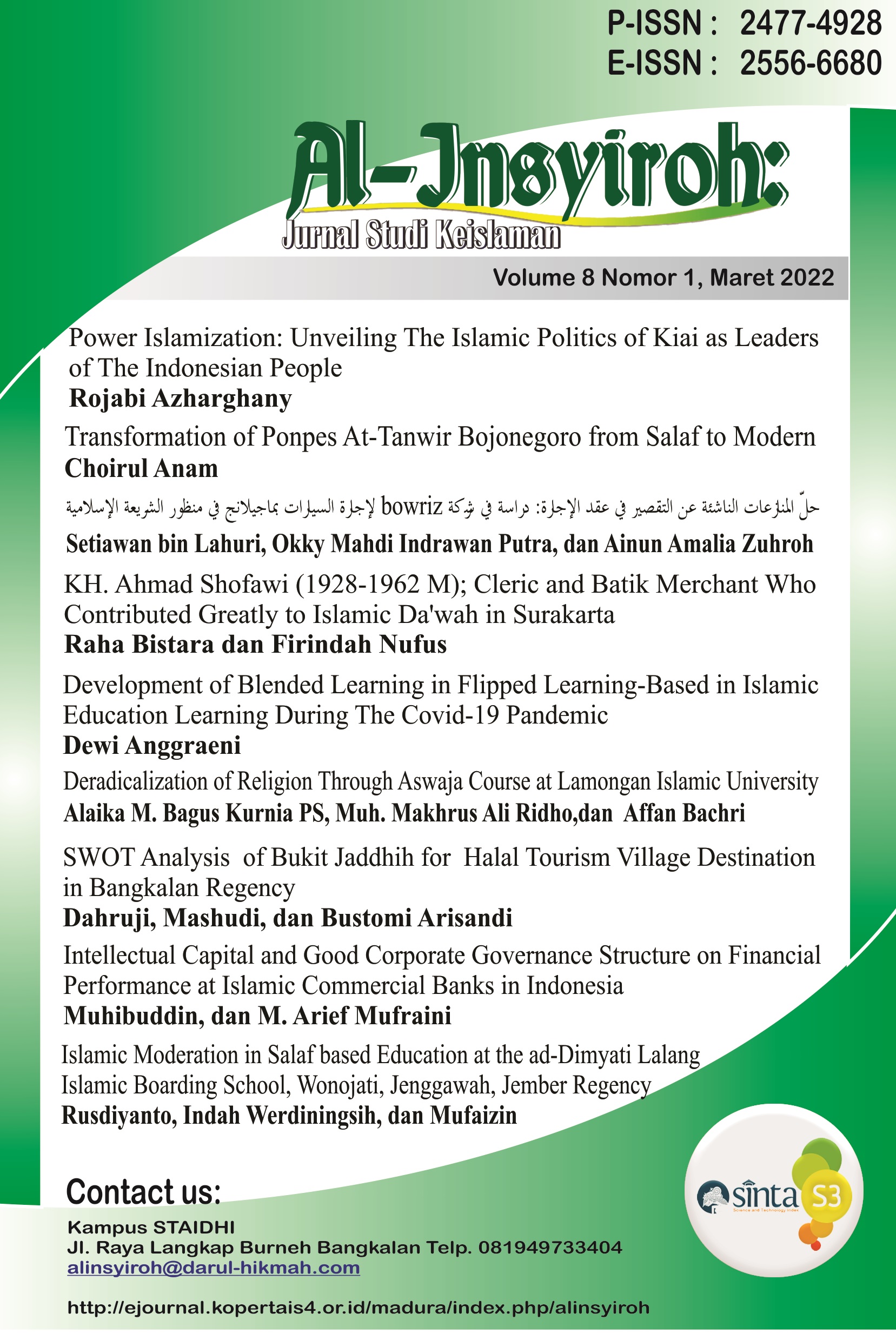Power Islamization: Unveiling the Islamic Politics of Kiai as Leaders of The Indonesian People
DOI:
https://doi.org/10.35309/alinsyiroh.v8i1.4689Keywords:
Kiai, community leader, Islamic politics, social historyAbstract
This research aims to review the Islamic politics of the Kiai affiliated with the religious organization called Nahdlatul Ulama (NU) examining the Kiai's Islamic politics focusing on the social-historical arguments and strategies promoted by the religious elites to keep their role in the lives of Muslims. Within the political dynamics of modern Islamic lifestyle, Kiai still holds their position as honorable figures. The methodology of this study uses the social history school as a research method to see the social background in the Islamic political history of the kiai as well as contains a critical aspect to analyze the dynamics of the kiai's Islamic politics. This study is carried out by reconstructing socio-political events involving traditionalist kiai on the Indonesian political stage from the independence period until the 2019 election. The main finding in this study is that the Islamic politics promoted by the Kiai are based on the Islamic teachings about social concern such as maslahah mursalah and kulliatul khoms which created the Kiai's movement concept, namely mabadi’ khoiru ummah (a path that shapes the best people) and syuun ijtimaiyah (social concern). The Kiai’s involvement in politics is based on this foundation. The significance of this study takes social history as a method by introducing a new approach in revealing the political and socio-cultural significance of the kiai in his involvement in the power-politics arena in Indonesia. So that it can fully demonstrate the values built by the kiai towards Muslims in political education that leads to building awareness of the nation and state.References
Abidin, M. Z. (2017). Ulama in Indonesian Urban Society: A View of Their Role and Position in the Change of Age. Jurnal Theologia, 28(2), 235–254. https://doi.org/10.21580/teo.2017.28.2.1863
Al-Hamdi, R. (2017). Moving towards a Normalised Path: Political Islam in Contemporary Indonesia. https://doi.org/10.18196/jgp.2017.0042.48-78
Arifianto, A. R. (2017). Practicing what it preaches? Understanding the contradictions between pluralist theology and religious intolerance within Indonesia’s Nahdlatul Ulama. Al-Jami’ah, 55(2), 241–264. https://doi.org/10.14421/ajis.2017.552.241-264
Asror, A. (2010). Reproduksi Islam dalam Tradisi Keberagamaan Populer di Lingkungan Masyarakat Santri Jawa.
Asyari, S. (2009). Nalar Politik NU dan Muhammadiyah. LKIS.
Azro’i, I., & Fuaidi, I. (2020). The Existence of Pesantren: Implication Study of Pesantren Leadership Regeneration in Central Java. Santri: Journal of Pesantren and Fiqh Sosial, 1(1), 1–12. https://doi.org/10.35878/santri.v1i1.203
Barton, G. (2002). Biografi Gus Dur. LKIS.
Barton, G. (2014). The Gülen Movement, Muhammadiyah and Nahdlatul Ulama: Progressive Islamic Thought, Religious Philanthropy and Civil Society in Turkey and Indonesia. Islam and Christian-Muslim Relations, 25(3), 287–301. https://doi.org/10.1080/09596410.2014.916124
Binder, L. (1960). Islamic Tradition and Politics : The Kijaji and the Alim. Comparative Studies in Society and History, 2(2), 250–256.
Bruinessen, M. Van. (1994). NU: Tradisi, Relasi-Relasi Kuasa dan Pencarian Wacana Baru. LKIS.
Bush, R., & Fealy, G. (2014). The political decline of traditional Ulama in Indonesia: The state, Umma and Nahdlatul Ulama. Asian Journal of Social Science, 42(5), 536–560. https://doi.org/10.1163/15685314-04205004
Bustami, A. L. (2009). Kiai Politik dan Politik Kiai. Pustaka Bayan.
Bustami, A. L. (2015). Resolusi Jihad: Perjuangan Ulama dari Menegakkan Agama Hingga Negara. Pustaka Tebuireng.
Choiri, E. (2002). PKB, Politik Jalan Tengah NU, Eksperimentasi Pemikiran Islam Inklusif dan Gerakan Kebangsaan Pasca Kembali ke Khitttah 1926. Pustaka Ciganjur.
Dhofier, Z. (1980). The Role of The Kiai in The Maintenance of Traditional Islam in Java (Issue 2). The Australian National University. https://openresearch-repository.anu.edu.au/bitstream/1885/11271/1/Dhofier_Z_1980.pdf
Diab, R. (2018). Legal-political rhetoric, human rights, and the constitution of medina. Rhetorica - Journal of the History of Rhetoric, 36(3), 219–243. https://doi.org/10.1525/rh.2018.36.3.219
Esposito, J. L. (1984). Islam and Politics. Syracuse University Press.
Falikul Isbah, M. (2020). Pesantren in The Changing Indonesian Context: History and Current Developments. Qudus International Journal of Islamic Studies (QIJIS), 8(1), 2020. https://doi.org/10.21043/qijis.v8i1.5629
Fealy, G. (2003). Ijtihad Politik Ulama: Sejarah NU 1952-1967. LKIS.
Feillard, Andree. (1997). Islam Tradisional dan Tentara dalam Orde Baru. In Tradisionalisme Radikal: Persinggungan Nahdlatul Ulama dengan Negara. LKIS.
Feillard, Andree. (1999). NU vis a vis Negara ; Pencarian Isi, Bentuk dan Makna. LKIS.
Feillard, Andree. (2002). Indonesian Traditionalits Islam’s Troubled Experience with Democracy. Archipel, 64, 117–144.
Feillard, Andrée. (2013). Nahdlatul Ulama in Indonesia. https://doi.org/10.1093/OXFORDHB/9780195395891.013.0007
Geertz, C. (1960). The Religion of Java. Massachusetts Institute of Technology.
Gueorguiev, D., Ostwald, K., & Schuler, P. (2019). Rematch: Islamic politics, mobilisation, and the Indonesian presidential election. Political Science, February. https://doi.org/10.1080/00323187.2019.1584733
Hadiz, V. R., & Teik, K. B. (2011). Approaching Islam and politics from political economy: A comparative study of Indonesia and Malaysia. Pacific Review, 24(4), 463–485. https://doi.org/10.1080/09512748.2011.596561
Hariyadi, A., Eko Pramono, S., & Yanto, H. (2018). Charismatic Leadership of Kiai in Developing an Organizational Culture of Islamic Boarding School. In The Journal of Educational Development JED (Vol. 6, Issue 1). https://doi.org/10.15294/JED.V6I1.20730
Hidayaturrahman, M., & Sudarman, S. (2019). Kiai and Political Relations Reconciling Politics and Religion in Indonesia. Al-Tahrir: Jurnal Pemikiran Islam, 18(2), 371. https://doi.org/10.21154/altahrir.v18i2.1384
Horikoshi, H. (1987). Kyai dan Perubahan sosial. Perhimpunan Pengembangan Pesantren dan Masyarakat.
Islam, M. N., Islam, M. S., Islam, M. N., & Islam, M. S. (2020). Islam and Democracy: A Philosophical Debate. In Islam and Democracy in South Asia (pp. 67–101). Springer International Publishing. https://doi.org/10.1007/978-3-030-42909-6_4
Ismail, F. (2011). The nahdlatul ulama: Its early history and contribution to the establishment of Indonesian State. Journal of Indonesian Islam, 5(2), 247–282. https://doi.org/10.15642/JIIS.2011.5.2.247-282
Jawad, N. (2013). Democracy in modern Islamic thought. British Journal of Middle Eastern Studies, 40(3), 324–339. https://doi.org/10.1080/13530194.2013.791138
Jay, R. R. (1969). Javanese Villagers: Social Relations in Rural Modjokuto. MIT Press.
Kinser, S. (1981). Annaliste Paradigm? The Geohistorical Structuralism of Fernand Braudel. The American Historical Review, 86(1), 63. https://doi.org/10.2307/1872933
Kosim. (2019). Law politics in sharia perspective. Humanities and Social Sciences Reviews, 7(4), 297–302. https://doi.org/10.18510/hssr.2019.7438
Lev, D. (1972). Islamic Courts in Indonesia: a Studi in the Political Bases of Legal Institution. University of California Press.
Maarif, A. S. (1987). Islam dan Masalah Kenegaraan: Studi Tentang Percaturan dalam Konstituante. LP3ES.
Maarif, A. S. (1988). Islam dan Politik di Indonesia. IAIN Sunan Kalijaga Press.
Maimuoen, A. G. (2014). Sejarah Fiqh Politik Islam: Upaya Memahami Lahirnya Model Negara Islam dalam Fiqh Sunni. In M. B. A. Hattani (Ed.), Khittah dan Khidmah: Kumpulan Tulisan Majma’ Buhuts An Nahdliyah. Majma Buhuts An Nahdliyah.
Maksum, M. N. R., Asy’arie, M., & Aly, A. (2020). Democracy education through the development of pesantren culture. Humanities and Social Sciences Reviews, 8(4), 10–17. https://doi.org/10.18510/hssr.2020.842
Maula, M. J. (2014). Kembali ke Khittah 1945: Negara Republik Indonesia adalah “Negara Islamâ€nya Umat Islam Indonesia Menurut NU. In M. B. A. Hatani (Ed.), Khittah dan Khidmah: Kumpulan Tulisan Majma’ Buhuts An Nahdliyah. Majma Buhuts An Nahdliyah.
Mufaizin, M. Nasionalisme dalam Perspektif Alquran dan Hadits. Al-Insyiroh, 5(1), 40-56.
Nastiti, A., & Ratri, S. (2018). Emotive Politics: Islamic Organizations and Religious Mobilization in Indonesia. Contemporary Southeast Asia: A Journal of International and Strategic Affairs, 40(2), 196–221. https://doi.org/10.1355/cs40-2b
Nasution, A. B. (1995). Aspirasi Pemerintahan Konstitusional di Indonesia: Studi Sosio-Legal atas Konstituante (1956-1959). Pustaka Utama Grafiti.
Noeh, M. F. (2014). Kyai di Panggung Pemilu: Dari Kyai Khos Sampai High Cost. Rene Book.
Noer, D. (1973). The Modernists Muslim Movement in Indonesian 1900–1942. Oxford University Press.
Noer, D. (1987). Partai Islam di Pentas Nasional. Grafiti Press.
Nubowo, Andar; Ng, J. C. (2019). The Three Streams Facing Indonesian Muslims : Pulls of Politics.
Pepinsky, T. (2019). Islam and Indonesia’s 2019 presidential election. Asia Policy, 14(4), 54–62. https://doi.org/10.1353/asp.2019.0049
Pepinsky, T. B., Liddle, R. W., & Mujani, S. (2012). Testing Islam’s Political Advantage: Evidence from Indonesia. American Journal of Political Science, 56(3), 584–600. https://doi.org/10.1111/j.1540-5907.2011.00570.x
Pribadi, Y. (2013). Religious Networks in Madura: Pesantren, Nahdlatul Ulama, and Kiai as the Core of Santri Culture. Al-Jami’ah: Journal of Islamic Studies, 51(1), 1. https://doi.org/10.14421/ajis.2013.511.1-32
Pribadi, Y. (2018). Islam, state and society in Indonesia : local politics in Madura. Routledge. http://lib1.org/_ads/35D9AC4C9B463056609C3D3C24056BB3
Rais, A. (1984). Gerakan Islam Internasional dan Pengaruhnya Bagi Gerakan Islam Indonesia. Prisma Ekstra, 36.
Ramdhan, T. W. (2019). Desain Kurikulum pendidikan Islam berbasis tauhid. Al-Insyiroh: Jurnal Studi Keislaman, 5(1), 118-134.
Ramdhan, T. W. (2018). Islam Nusantara: Pribumisasi Islam ala NU. Al-Insyiroh: Jurnal Studi Keislaman, 2(1), 73-91.
Romli, L. (2019). Political Identity and Challenges for Democracy Consolidation in Indonesia. Politik Indonesia: Indonesian Political Science Review, 4(1), 78–98. https://doi.org/10.15294/ipsr.v4i1.17214
Sobari, M. (2000). Gus Dur di Istana Rakyat. LKBN Antara.
Stanizai, Z. (2020). How Islamic is an Islamic State? A Theoretical Debate on Islamic Political Order. https://doi.org/10.33774/COE-2020-LRZ88
Suryanegara, A. M. (1995). Menemukan Sejarah Wacana Pergerakan Islam di Indonesia. Mizan.
Tim ELVEKA Institute. (2008). Indonesia Negeri Kiai: KH. A. Sofyan Miftahul Arifin Bukan Kiai Kampung. ELVEKA Institute.
Tim PW LBM NU Jawa Timur. (2018). Islam Nusantara; Manhaj Dakwah Islam Aswaja di Nusantara. PW LTN NU Jawa Timur.
Turmudi, E. (2008). Religion and Politics: A Study on Political Attitudes of Devout Muslims and the Role of the Kyai in Contemporary Java. Asian Journal of Social Science, 23(2), 18–41. https://doi.org/10.1163/030382495x00105
Umam, A. K., & Junaidi, A. A. (2017). Political Islam: The shrinking trend and the future trajectory of Islamic political parties in Indonesia. Masyarakat, Kebudayaan Dan Politik, 30(1), 1. https://doi.org/10.20473/mkp.v30i12017.1-12
Wahid, A. (1974). Pesantren Sebagai Subkultur. In D. Raharjo (Ed.), Pesantren dan Pembaharuan. LP3ES.
Winarni, L. (2014). The political identity of ulama in the 2014 Indonesian presidential election. Al-Jami’ah, 52(2), 257–269. https://doi.org/10.14421/ajis.2014.522.257-269
Yusuf, S. E. (1983). Dinamika Kaum Santri. Rajawali.
Zain, M. F., & Ridwan, R. (2020). God and Human Sovereignty in Islamic Political Tradition. IjtimÄ’iyya: Journal of Muslim Society Research, 5(1), 10–18. https://doi.org/10.24090/ijtimaiyya.v5i1.2718
Ziemek, M. (1983). Pesantren Dalam Perubahan Sosial. P3M.
Downloads
Published
How to Cite
Issue
Section
License
Copyright (c) 2022 Al-Insyiroh: Jurnal Studi Keislaman

This work is licensed under a Creative Commons Attribution-ShareAlike 4.0 International License.

This work is licensed under a Creative Commons Attribution-ShareAlike 4.0 International License.









